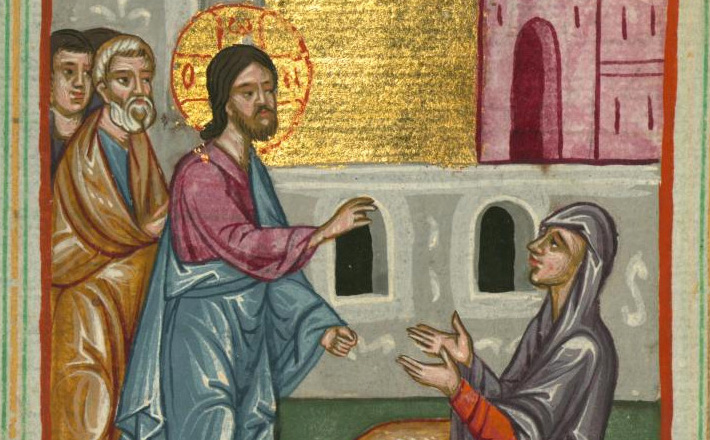Commentary on Matthew 15:[10-20] 21-28
When Jesus entered Tyre and Sidon, an indigenous Canaanite woman formed a one-woman welcoming committee.
Jesus is no stranger to Tyre and Sidon; he compared that region to Chorazin, Bethsaida and Capernaum where the inhabitants did not respond positively to Jesus’ miracles. Thus Matthew’s readers might anticipate Jesus doing powerful deeds in Tyre and Sidon and a positive response (Matthew 11:20-24). The Canaanite woman’s greeting is part of a pattern; we find her words on the lips of others who approach Jesus with pressing needs: “Have mercy on me, Lord, Son of David” (Matthew 15:22; see also 9:27 and 20:30). The Matthean Jesus is the son of David from the beginning of the narrative as revealed in the genealogy (Matthew 1:1, 16). Perhaps with her initial words, the woman is claiming an ancestral relationship to Jesus. Three women in Jesus’ genealogy are Canaanite women: Rahab, Tamar, and Ruth (Matthew 1:3, 5). The anonymous woman’s foremothers are Jesus’ kinfolk. The words “Have mercy” demonstrate the Canaanite woman’s knowledge of his power and willingness to show mercy on all who approach him (see Matthew 14:13-21). The title “lord” by which she addresses Jesus acknowledges him as a man in relation to her as a woman and demonstrates respect for Jesus as a Rabbi. The phrase “on me” reveals her as the object the mercy she seeks, her request is a personal one; what impacts child, affects mother. And finally the title, “Son of David” is perhaps her way of acknowledging him as her kin, as royalty, and as the Jewish Messiah (anointed one). The Canaanite woman strategically, clearly and succinctly confronts and informs Jesus of her problem: “my daughter is tormented by a demon” (verse 22). She does not directly request healing for her child, she desires mercy, which she presumes would take the form of an exorcism. After all, the rumor was that people were simply bringing their sick and possessed to Jesus, and he healed them even when they touched the fringe of his garments (Matthew 14:34-36; 9:20-21). She does not bring her daughter to Jesus, it appears. But she expects something to happen at the intersection of her intercession and Jesus’ mercy.
In the previous episode (Matthew 15:10-20) Jesus had taught the crowds — including some Pharisees — and his disciples that a person is defiled not by what she puts in her stomach but by that which originates in her heart and is manifested in her life (for example, murder, adultery, fornication, theft, deception). The preceding narrative implies that one’s race, ethnicity, gender, disability, or class does not defile a person; hence, the reader might be surprised by both Jesus’ silence and his response to the Canaanite woman. Initially, Jesus fails to acknowledge the Canaanite woman and her request for mercy. Anyone with a pressing need knows how horrible it feels to have a dire or significant request for help or information met with dead silence (15:23a). Women’s words are too often met with silence or are interrupted or disrespected, by men and sometimes by other women. Those times in my life when I asked for information or help and received nothing but silence, I would have preferred a curt: “H*ll, no.”
No one immediately responds to the Canaanite woman or gives the impression that they will respond. The disciples urge Jesus to send her away because, it appears, they are annoyed by her continued shouting, her refusal to take silence for an answer (Matthew 15:23b; see Acts 16:16-18). Too often we cannot or refuse to empathize with people whose experience is different from our own. If the oppression, injustice, or pain is not happening in our house and neighborhood or does not impact our race, gender, class, or sexuality, then we dismiss it as unwelcomed, unjustified noise. Jesus’ response to the apostles’ urging to send the Canaanite woman away seems to affirm their desire to dismiss her: “I was sent only to the lost sheep of the house of Israel” (Matthew 15:24, NRSV). The fact that her people’s blood runs through his veins and that his people’s blood runs through her veins does not move Jesus! If our common humanity, our relatedness, does not move us, what will?
The Canaanite woman persists. Like Sojourner Truth, Rosa Parks, Congresswoman Shirley Chisholm, Oprah Winfrey, Senator Hillary Clinton, Michelle Obama, Senator Elizabeth Warren, and Senator Kamala Harris, the Canaanite woman persisted. But so many anonymous women like the Canaanite woman have persisted as lone minority voices among a majority of authoritative and powerful men. She persisted! She didn’t go away; she won’t be dismissed. She draws closer and kneels, and in the vernacular of a determined woman she cries, “Master, help me,” (Matthew 15:25). Her plea for help is met with the language of cultural difference and distance: “It is not fair to take the children’s food and throw it to the dogs” (15:26).
It appears that in antiquity, Greeks and other Gentiles had a more familiar relationship with household pets, particularly with dogs, than did the average Jewish person. The ancient Greeks may have been more likely to have dogs as endeared household pets that they fed from under the table than would have been the case in many Jewish households.1 This cultural difference might explain the woman’s response: “Yes, Lord, yet even the dogs eat the crumbs that fall from their masters’ table,” (Matthew 15:27). The Canaanite woman’s cultural context differs from Jesus’; they allow their pets to be fed while the children eat. One can feed the children and feed the pets too!
In the end, Matthew’s Jesus responds by commending the woman for her faith. (In Mark’s version, Jesus commends the Syrophoenician woman for her word or logos with no mention of faith; see Mark 7:24-30.) Matthew strategically calls what this woman does as act of faith. Yet Jesus does not perform an exorcism; he simply says, “Let it be done for you as you wish.” He does not say let it be done as you believed but as you will. The woman’s will to power manifested by her persistence identified as faith led to her daughter’s healing.
Interestingly, the all-knowing narrator notifies the reader that the woman’s daughter was healed instantly (Matthew 15:28b); Jesus does not. Perhaps faith engenders persistence or maybe persistence feeds faith. Either way, persistence and faith make a powerful pair. Significantly, Matthew inserted a summary of Jesus’ healing activities immediately after Jesus’ encounter with the Canaanite woman and despite mentioning specific ailments twice; exorcism is omitted (15:29-31). Never underestimate the power of a persistent woman and the God in whom she believes.
Notes
1 Francis D. Lazenby, “Greek and Roman Household Pets,” The Classical Journal 44 (1949): 245–52.


August 20, 2017